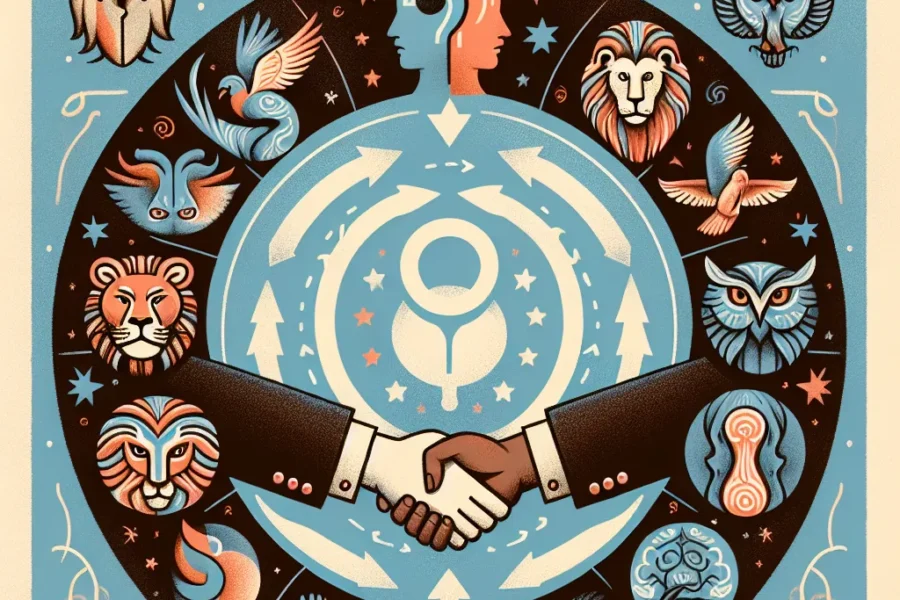Understanding the complex relationship between personality and spirituality has long been an area of intrigue for both psychologists and spiritual leaders. This intersection is a rich field of exploration that sheds light on how individual characteristics shape spiritual beliefs and practices, as well as how spirituality can influence one’s personality. In this comprehensive analysis, we will dive deep into this topic, addressing the different facets of how personality and spirituality intertwine, influence, and complement each other.
Personality, defined as an individual’s characteristic patterns of thought, emotion, and behavior, is the foundation upon which many aspects of a person’s life are built. This includes their interactions with others, their coping mechanisms, and their worldview. A key model that has been widely accepted in understanding personality is the Big Five personality traits framework, which delineates five core traits: openness, conscientiousness, extraversion, agreeableness, and neuroticism. Each of these traits can significantly impact how an individual perceives and engages with spiritual matters.
Spirituality, on the other hand, can be described as a person’s individual experience with the sacred or divine, which may encompass religious traditions, personal beliefs, and practices aimed at personal growth and transcendence. It is an aspect of human experience that explores the ultimate questions about life, purpose, and the connection to something greater than oneself. Spirituality is often associated with feelings of peace, compassion, gratitude, and a deep sense of meaning.
The intersection of personality and spirituality becomes most apparent when examining how individual differences in personality traits relate to spiritual inclinations and experiences. For instance, individuals high in openness are more likely to engage in spiritual exploration and hold unconventional beliefs. Their willingness to consider new experiences extends to the spiritual domain, where they often embrace diverse beliefs and practices. Moreover, this openness can foster a more profound sense of awe and wonder about the universe, which is at the heart of many spiritual experiences.
Furthermore, conscientious individuals, with their propensity for structure and reliability, may lean towards more traditional and organized forms of spirituality. The discipline inherent in their personality could translate into a dedication to spiritual practices and consistent involvement in religious communities. Such individuals often find solace in the rituals and the systematic approach to spirituality.
Extraversion, characterized by sociability and high energy levels, can influence the communal and expressive aspects of spirituality. Extraverts may be drawn to group-based spiritual activities where they can connect with others, share experiences, and express their beliefs openly. Their orientation towards external stimulation aligns well with vibrant, community-driven spiritual practices.
Agreeableness, with its emphasis on empathy and cooperation, is often associated with spirituality that is focused on compassion and service towards others. The kindness and altruism associated with agreeableness find resonance in many spiritual and religious traditions that prioritize the well-being of the community and humanitarian acts.
Neuroticism, which involves a tendency towards emotional instability and negative feelings, can have a complex relationship with spirituality. Some individuals with high levels of neuroticism may seek out spiritual practices as a coping mechanism to manage stress and find inner peace. Conversely, severe anxiety or existential worries can hinder spiritual growth or lead to struggles with religious doubts.
The symbiotic relationship between personality and spirituality is also reflected in the transformative potential that spiritual experiences can have on personality. Engaging deeply with spirituality can lead to personal growth and changes in behavior, values, and self-concept. For example, spiritual practices such as meditation and mindfulness have been shown to reduce stress and enhance emotional regulation, potentially impacting the levels of neuroticism a person exhibits.
Additionally, spirituality can foster a greater sense of interconnectedness with others and the environment, likely increasing agreeableness and pro-social behaviors. Spiritual transformations can also induce a paradigm shift, opening individuals up to new ways of thinking and being, thus impacting their openness trait.
Understanding the intersection between personality and spirituality also has practical implications. In the realm of personal development, recognizing this intersection allows individuals to tailor their spiritual practices in a way that aligns with their personality. For instance, a highly introverted person may prefer solitary contemplative practices, while an extraverted person might thrive in community worship settings.
Moreover, counselors and therapists can integrate this knowledge into their practices, considering clients’ personality traits when guiding them on their spiritual journeys. Such an integrated approach can aid individuals in resolving conflicts between their spiritual aspirations and their inherent dispositions, leading to more fulfilling spiritual experiences.
In the broader context, this intersection also facilitates a deeper understanding of cultural differences in spirituality. Different cultures emphasize particular personality traits, which in turn shape the spiritualities that flourish within those cultural contexts. This may reflect why certain spiritual practices are more prevalent or resonant in one culture compared to another.
Finally, the relationship between personality and spirituality speaks to the human search for meaning. While personality traits might dispose us towards certain spiritual paths, it is often within the spiritual domain that we seek to transcend our limitations and grow beyond our innate tendencies. Spirituality can provide a space for reflection, transformation, and the discovery of a more profound sense of purpose and connection that transcends individual differences.
In conclusion, the intersection of personality and spirituality is a multidimensional one that involves complex interactions. Each shapes and is shaped by the other in a dynamic process that impacts an individual’s journey through life. By acknowledging the significance of this intersection, individuals can seek a more personalized and authentic spiritual path that harmonizes with their intrinsic nature while fostering growth and transcending personal limitations. Whether one is a spiritual seeker, a mental health professional, or simply someone interested in the deeper aspects of human existence, the exploration of this interplay between the inner self and the quest for spiritual understanding remains a compelling and enriching pursuit.



Leave a Comment